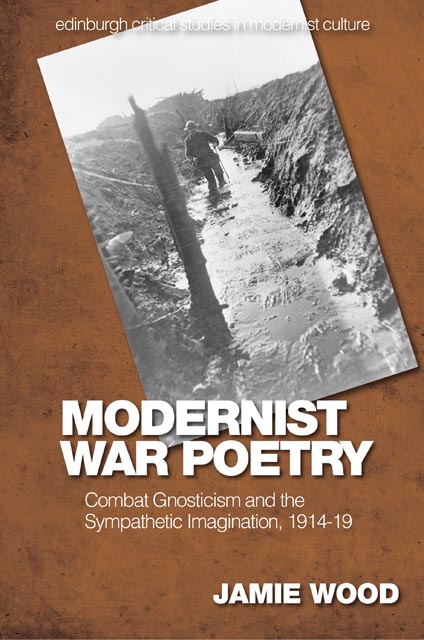Book contents
- Frontmatter
- Contents
- Timelines
- Acknowledgements
- Series Editors’ Preface
- Introduction
- 1 Early Modernist Responses to Combatant Poetry: 1914–Spring 1915
- 2 Reassessing Disaster: 1915
- 3 The Three Lives of Gnosticism: 1916–Summer 1917
- 4 An Emergent Critique of War Experience: Autumn 1917–Spring 1919
- 5 The Form and Practice of Modernist Distaste: Summer–Autumn 1919
- Conclusion
- Bibliography
- Index
4 - An Emergent Critique of War Experience: Autumn 1917–Spring 1919
Published online by Cambridge University Press: 13 April 2023
- Frontmatter
- Contents
- Timelines
- Acknowledgements
- Series Editors’ Preface
- Introduction
- 1 Early Modernist Responses to Combatant Poetry: 1914–Spring 1915
- 2 Reassessing Disaster: 1915
- 3 The Three Lives of Gnosticism: 1916–Summer 1917
- 4 An Emergent Critique of War Experience: Autumn 1917–Spring 1919
- 5 The Form and Practice of Modernist Distaste: Summer–Autumn 1919
- Conclusion
- Bibliography
- Index
Summary
Transmutations into Poetry
The problems raised by Wallace Stevens’s sequence were already widely clear within modernist cultures. In 1918 Poetry awarded the Helen Haire Levenson Prize to John Curtis Underwood for his Serbian war poem, ‘The Song of the Cheechas’ (Poetry: June 1918). It appeared with a group of poems entitled ‘War Times’ which gave vent to Underwood’s antagonism towards the Central Powers. Methodologically, it followed the process Underwood developed in the 1917 collection War Flames and took as its source material poems covering each of Europe’s main theatres of war that relied on the first-hand experience of soldiers and other combat witnesses. Underwood went to great lengths to make this method clear. He highlighted reuse of material from a range of sources which included May Sinclair’s A Journal of Impressions in Belgium. Harriet Monroe singled out this approach when praising War Flames, calling it ‘a crowded frieze showing the marching of all nations through the terrors and agonies of the cataclysmic struggle’.
Underwood did not however cite a source for his poem on the Cheechas and in January 1919 Paul Fortier Jones alleged Underwood had unduly paraphrased his memoir With Serbia into Exile (1916). Jones went to Serbia in September 1915 as part of a humanitarian relief effort and was the only American with the local army as it catastrophically retreated through the Albanian mountains. As Jones explained, cheecha means uncle, and in Serbia it was a term given to men over the age of thirty. Jones found however that many of the cheechas were well over forty. He felt that Underwood had taken his core point, that the Serb seems never too old to fight, without due attribution. Jones complained that Underwood had ‘contrived to add so little to the original source of his verse that only simple honesty must have impelled him to give due credit to that source’. Without that acknowledgement, Jones concluded, Underwood wanted to deceive the reading public about his own combat credentials.
The accusation was not entirely unfounded. Underwood’s poem lifted whole phrases and images verbatim from Jones’s text. Monroe defended Poetry’s award of the Prize on the administrative ground that it was irrevocable, and that in any case Underwood had already donated his prize money to the United War Work Campaign. The most crucial element of her defence however was the reassertion of the evolving modernist poetic of the magus.
- Type
- Chapter
- Information
- Modernist War PoetryCombat Gnosticism and the Sympathetic Imagination, 1914-19, pp. 135 - 173Publisher: Edinburgh University PressPrint publication year: 2022



